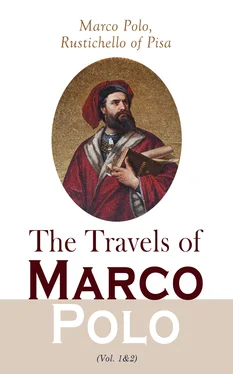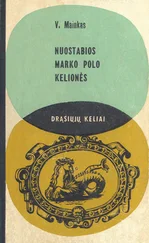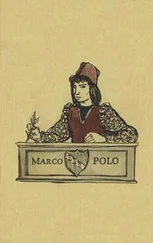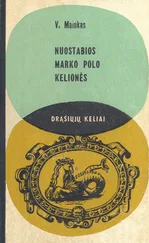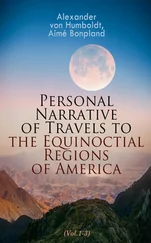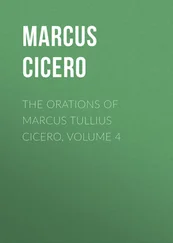And when he had ended this his prayer to God the Sovereign Father and Giver of all grace, and whilst the Calif and all the Saracens, and other people there, were looking on, the mountain rose out of its place and moved to the spot which the Calif had pointed out! And when the Calif and all his Saracens beheld, they stood amazed at the wonderful miracle that God had wrought for the Christians, insomuch that a great number of the Saracens became Christians. And even the Calif caused himself to be baptised in the name of the Father and of the Son and of the Holy Ghost, Amen, and became a Christian, but in secret. Howbeit, when he died they found a little cross hung round his neck; and therefore the Saracens would not bury him with the other Califs, but put him in a place apart. The Christians exulted greatly at this most holy miracle, and returned to their homes full of joy, giving thanks to their Creator for that which He had done.[NOTE 1]
And now you have heard in what wise took place this great miracle. And marvel not that the Saracens hate the Christians; for the accursed law that Mahommet gave them commands them to do all the mischief in their power to all other descriptions of people, and especially to Christians; to strip such of their goods, and do them all manner of evil, because they belong not to their law. See then what an evil law and what naughty commandments they have! But in such fashion the Saracens act, throughout the world.
Now I have told you something of Baudas. I could easily indeed have told you first of the affairs and the customs of the people there. But it would be too long a business, looking to the great and strange things that I have got to tell you, as you will find detailed in this Book.
So now I will tell you of the noble city of Tauris.
NOTE 1.—We may remember that at a date only three years before Marco related this story (viz. in 1295), the cottage of Loreto is asserted to have changed its locality for the third and last time by moving to the site which it now occupies.
Some of the old Latin copies place the scene at Tauris. And I observe that a missionary of the 16th century does the same. The mountain, he says, is between Tauris and Nakhshiwan, and is called Manhuc . ( Gravina , Christianita nell' Armenia , etc., Roma, 1605, p. 91.)
The moving of a mountain is one of the miracles ascribed to Gregory
Thaumaturgus. Such stories are rife among the Mahomedans themselves. "I
know," says Khanikoff, "at least half a score of mountains which the
Musulmans allege to have come from the vicinity of Mecca."
Ramusio's text adds here: "All the Nestorian and Jacobite Christians from that time forward have maintained a solemn celebration of the day on which the miracle occurred, keeping a fast also on the eve thereof."
F. Göring, a writer who contributes three articles on Marco Polo to the Neue Züricher-Zeitung , 5th, 6th, 8th April, 1878, says: "I heard related in Egypt a report which Marco Polo had transmitted to Baghdad. I will give it here in connection with another which I also came across in Egypt.
"'Many years ago there reigned in Babylon, on the Nile, a haughty Khalif who vexed the Christians with taxes and corvées. He was confirmed in his hate of the Christians by the Khakam Chacham Bashi or Chief Rabbi of the Jews, who one day said to him: "The Christians allege in their books that it shall not hurt them to drink or eat any deadly thing. So I have prepared a potion that one of them shall taste at my hand: if he does not die on the spot then call me no more Chacham Bashi!" The Khalif immediately sent for His Holiness the Patriarch of Babylon, and ordered him to drink up the potion. The Patriarch just blew a little over the cup and then emptied it at a draught, and took no harm. His Holiness then on his side demanded that the Chacham Bashi should quaff a cup to the health of the Khalif, which he (the Patriarch) should first taste, and this the Khalif found only fair and right. But hardly had the Chacham Bashi put the cup to his lips than he fell down and expired.' Still the Musulmans and Jews thirsted for Christian blood. It happened at that time that a mass of the hill Mokattani became loose and threatened to come down upon Babylon. This was laid to the door of the Christians, and they were ordered to stop it. The Patriarch in great distress has a vision that tells him summon the saintly cobbler (of whom the same story is told as here)—the cobbler bids the rock to stand still and it does so to this day. 'These two stories may still be heard in Cairo'—from whom is not said. The hill that threatened to fall on the Egyptian Babylon is called in Turkish Dur Dagh , 'Stay, or halt-hill.' (L.c. April, 1878")— MS. Note , H. Y.
Table of Contents
OF THE NOBLE CITY OF TAURIS.
Tauris is a great and noble city, situated in a great province called YRAC, in which are many other towns and villages. But as Tauris is the most noble I will tell you about it.[NOTE 1]
The men of Tauris get their living by trade and handi crafts, for they weave many kinds of beautiful and valuable stuffs of silk and gold. The city has such a good position that merchandize is brought thither from India, Baudas, CREMESOR,[NOTE 2] and many other regions; and that attracts many Latin merchants, especially Genoese, to buy goods and transact other business there; the more as it is also a great market for precious stones. It is a city in fact where merchants make large profits.[NOTE 3]
The people of the place are themselves poor creatures; and are a great medley of different classes. There are Armenians, Nestorians, Jacobites, Georgians, Persians, and finally the natives of the city themselves, who are worshippers of Mahommet. These last are a very evil generation; they are known as TAURIZI.[NOTE 4] The city is all girt round with charming gardens, full of many varieties of large and excellent fruits.[NOTE 5]
Now we will quit Tauris, and speak of the great country of Persia. [From
Tauris to Persia is a journey of twelve days.]
NOTE 1.—Abulfeda notices that TABRÍZ was vulgarly pronounced Tauriz , and this appears to have been adopted by the Franks. In Pegolotti the name is always Torissi .
Tabriz is often reckoned to belong to Armenia, as by Hayton. Properly it is the chief city of Azerbaiján , which never was included in 'IRAK. But it may be observed that Ibn Batuta generally calls the Mongol Ilkhan of Persia Sáhib or Malik ul-'Irák , and as Tabriz was the capital of that sovereign, we can account for the mistake, whilst admitting it to be one. [The destruction of Baghdad by Hulaku made Tabriz the great commercial and political city of Asia, and diverted the route of Indian products from the Mediterranean to the Euxine. It was the route to the Persian Gulf by Kashan, Yezd, and Kermán, to the Mediterranean by Lajazzo, and later on by Aleppo—and to the Euxine by Trebizond. The destruction of the Kingdom of Armenia closed to Europeans the route of Tauris.—H. C.]
NOTE 2.— Cremesor , as Baldelli points out, is GARMSIR, meaning a hot region, a term which in Persia has acquired several specific applications, and especially indicates the coast-country on the N.E. side of the Persian Gulf, including Hormuz and the ports in that quarter.
NOTE 3.—[Of the Italians established at Tabriz, the first whose name is mentioned is the Venetian Pietro Viglioni (Vioni); his will, dated 10th December, 1264, is still in existence. ( Archiv. Venet. XXVI. pp. 161–165; Heyd , French Ed., II. p. 110.)—H. C.] At a later date (1341) the Genoese had a factory at Tabriz headed by a consul with a council of twenty four merchants, and in 1320 there is evidence of a Venetian settlement there. ( Elie de la Prim , 161; Heyd , II. 82.)
Читать дальше
